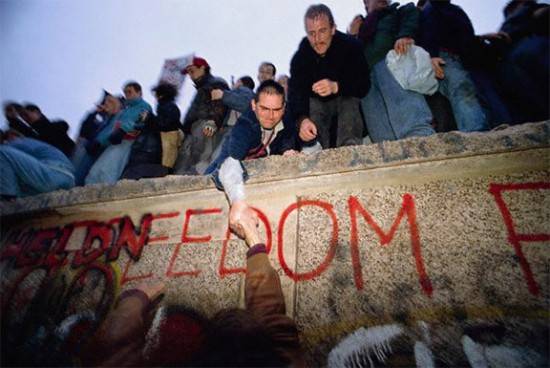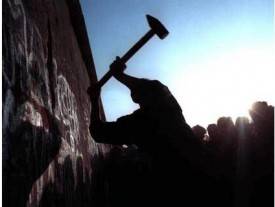Movies are a powerful tool for facilitating discussions and discoveries about cultures—including East Germany since the fall of the Berlin Wall. Although the version of reality the movies present is not the whole picture, it can help us find a way to frame the complex realities that existed in divided Germany, as well as after unification.

The European Union Center (EUC) hosted two German movie screenings last week as a part of their European Movie Nights this fall with the theme of “Commemorating the 20th Anniversary of the Fall of the Berlin Wall.” There was a screening of No Place to Go (Die Unberührbare) on Monday at 7:00 p.m. and a showing of The Lives of Others (Das Leben der Anderen) on Wednesday at 7:00 p.m., both in the Lucy Ellis Lounge in the Foreign Language Building. Earlier this fall, the movie night selections were Up and Down and Three Colors: White (part two of a trilogy). There are no more screenings scheduled for this semester, but the EUC will host the screening of more European movies next semester.
The European Movie Nights served as part of the larger commemorative events EUC hosted last week, including a faculty roundtable panel last Monday afternoon and the multi-departmental sponsored Choosing Change symposium that took place November 11-13 on the UIUC campus.
I spoke with Sebnem Ozkan, the EUC’s outreach coordinator, after Monday’s film showing. She mentioned that beyond its general historical significance, one of the reasons the EUC wanted to commemorate the anniversary of the Berlin Wall falling was because of the event’s pivotal role in allowing Germany to become part of the pre-existing European Union.
Professor Anke Pinkert introduced Monday’s film screening by reminding the audience that these films invite us to think about who is telling the story. Pinkert also explained that “film culture in Germany was very mainstream in 1989. There was a tendency to avoid the fall of the Berlin Wall in the years directly afterward. But a few people were trying to figure out what cinematic language they could use to talk about it.”
The viewing crowd was a little bigger on Wednesday than on Monday. And by a little bigger, I mean every seat was filled and extra chairs were needed.
As Pinkert introduced the film on Wednesday night, she reminded viewers that The Lives of Others is “not necessarily a window into the historical and political reality.” It tells a story that’s at the same time “historically specific but also universally human.” She said this film “unintentionally invites us to think about which stories become successful and which are marginalized.”
There was a question and answer segment directly after Wednesday’s screening. Jonathan Putnam said he decided to stay for it because, “It was a movie that deserved to be talked about.” He was one student of several in the current session of German 212 that attended on Wednesday.
Audience members asked how realistic the portrayal of the Stasi was in this film. Pinkert said some East Germans who saw the film “were critical that the Stasi were portrayed in a simplistic way.” In real life, “they would have been more insidious.” Putnam suggested we could read the portrayal of the Stasi in this film “as an illustration of the government slowly declining.” But maybe these movies still explore aspects of real experiences even if they are not precisely “factual.” As Pinkert expressed, film is a metaphor. “It’s a vehicle for telling a story.”
 Some current undergraduates don’t have firsthand memories of the Berlin Wall falling. Christopher Petersen, a graduating senior in Advertising, explained that “I was 4 when the wall fell and have absolutely no memory of it, and vague, if any recollection of the Cold War.” He also said that “Most everything I know is from class discussions as I was in a couple German language classes. Also maybe a little from other people’s conversations and some news-media.” The increasing reality that the event is not in recent memory anymore almost makes the stories we tell about it on film more significant. Our understanding of history can be altered as we closely examine what happened in certain situations.
Some current undergraduates don’t have firsthand memories of the Berlin Wall falling. Christopher Petersen, a graduating senior in Advertising, explained that “I was 4 when the wall fell and have absolutely no memory of it, and vague, if any recollection of the Cold War.” He also said that “Most everything I know is from class discussions as I was in a couple German language classes. Also maybe a little from other people’s conversations and some news-media.” The increasing reality that the event is not in recent memory anymore almost makes the stories we tell about it on film more significant. Our understanding of history can be altered as we closely examine what happened in certain situations.
The real experience of East Germany remains largely a mystery to me and probably many other Americans. Dan Pagliuzza, recent UIUC graduate, said, “East Germany I think of as a place … that was not modernized, much smaller than the rest of Germany, and not nearly as important. These were the [thoughts] I had as a kid though not necessarily looking at the place negatively especially later on when watching the film Spy Game . . . where there was a more a dramatic depiction of Berlin at the time.” His account confirms that the things we understand about these events as children can change and mature as we do.
Regardless of our memories of the event, the world changed when the Berlin Wall fell. If we can see through a fictional character’s eyes for a short time, we can connect with a perspective different than our own. Good films provoke our curiosity to find out more about the things we don’t fully understand. The ones presented by the EUC’s film nights this fall are no exception.








